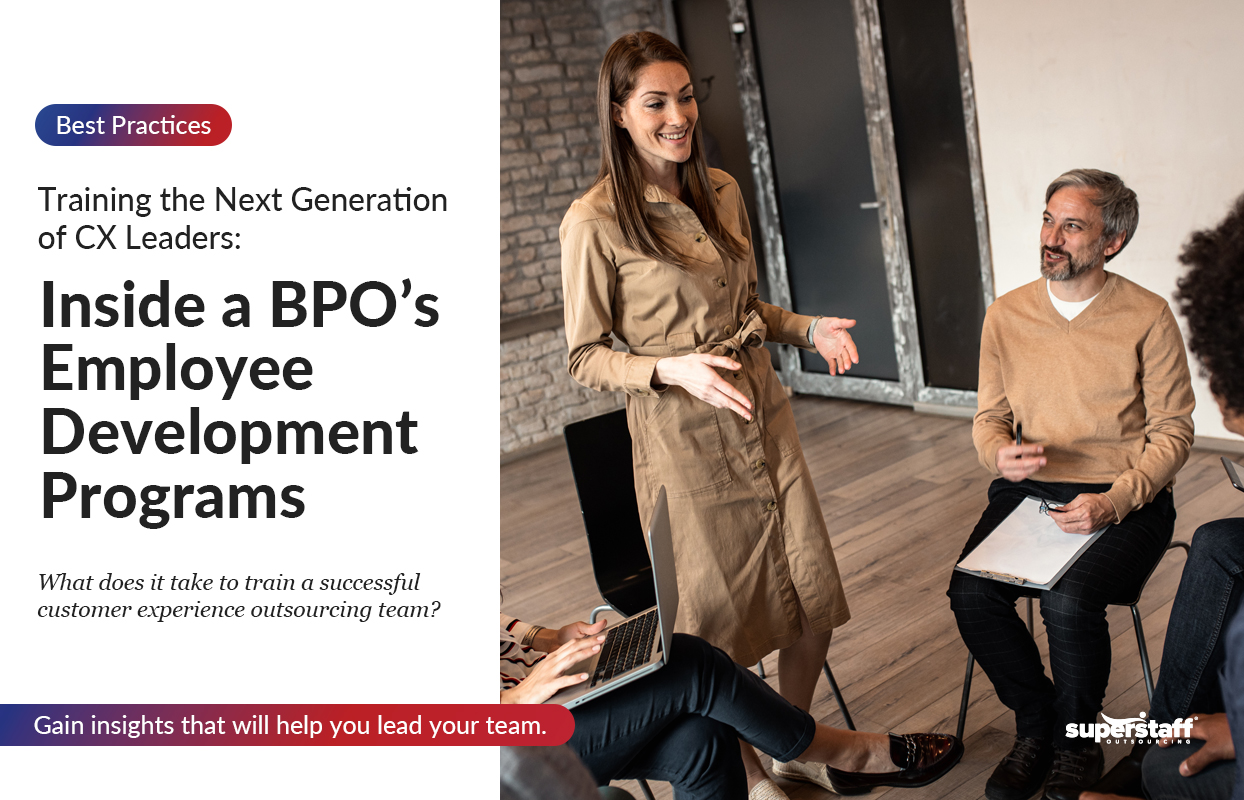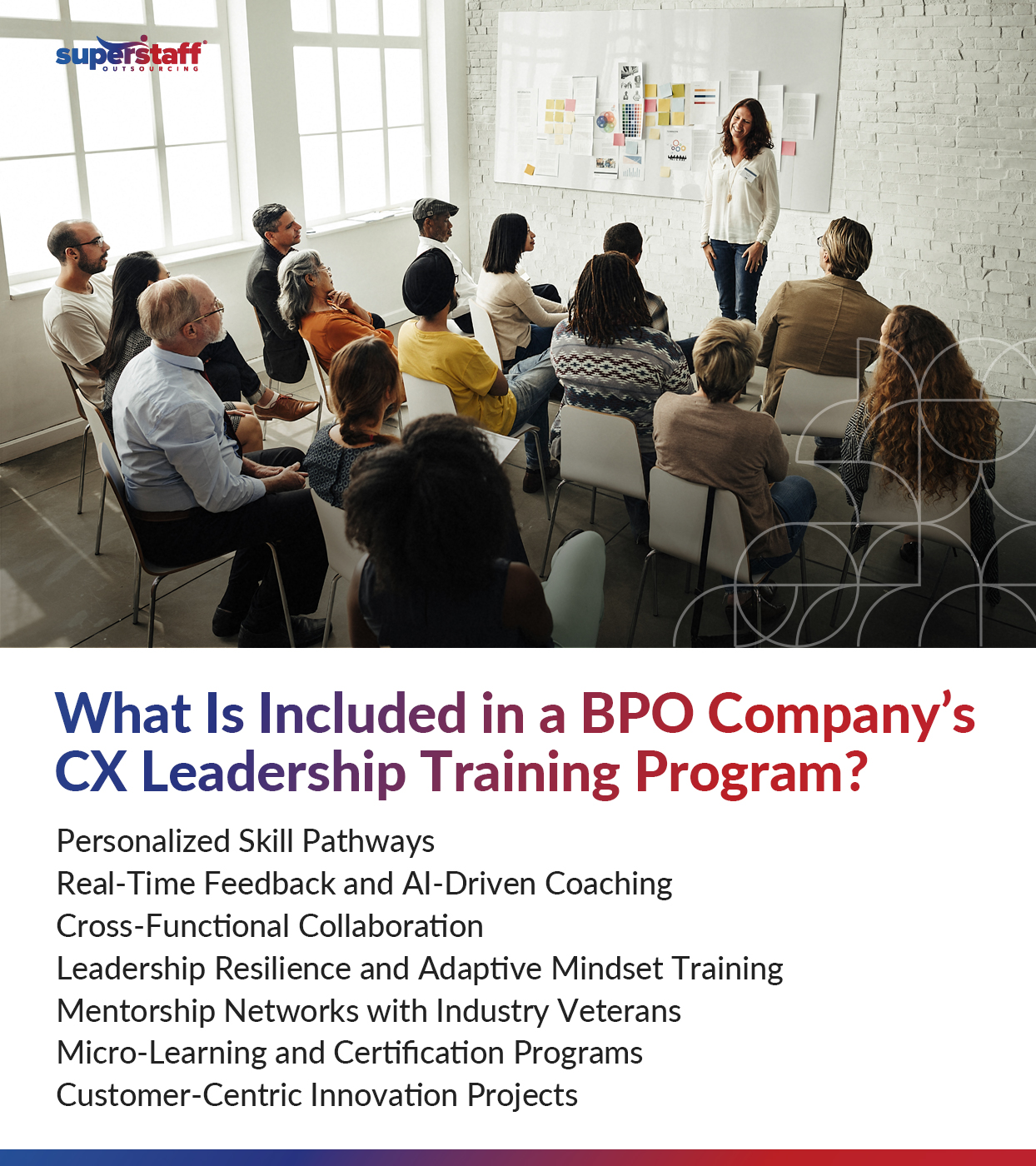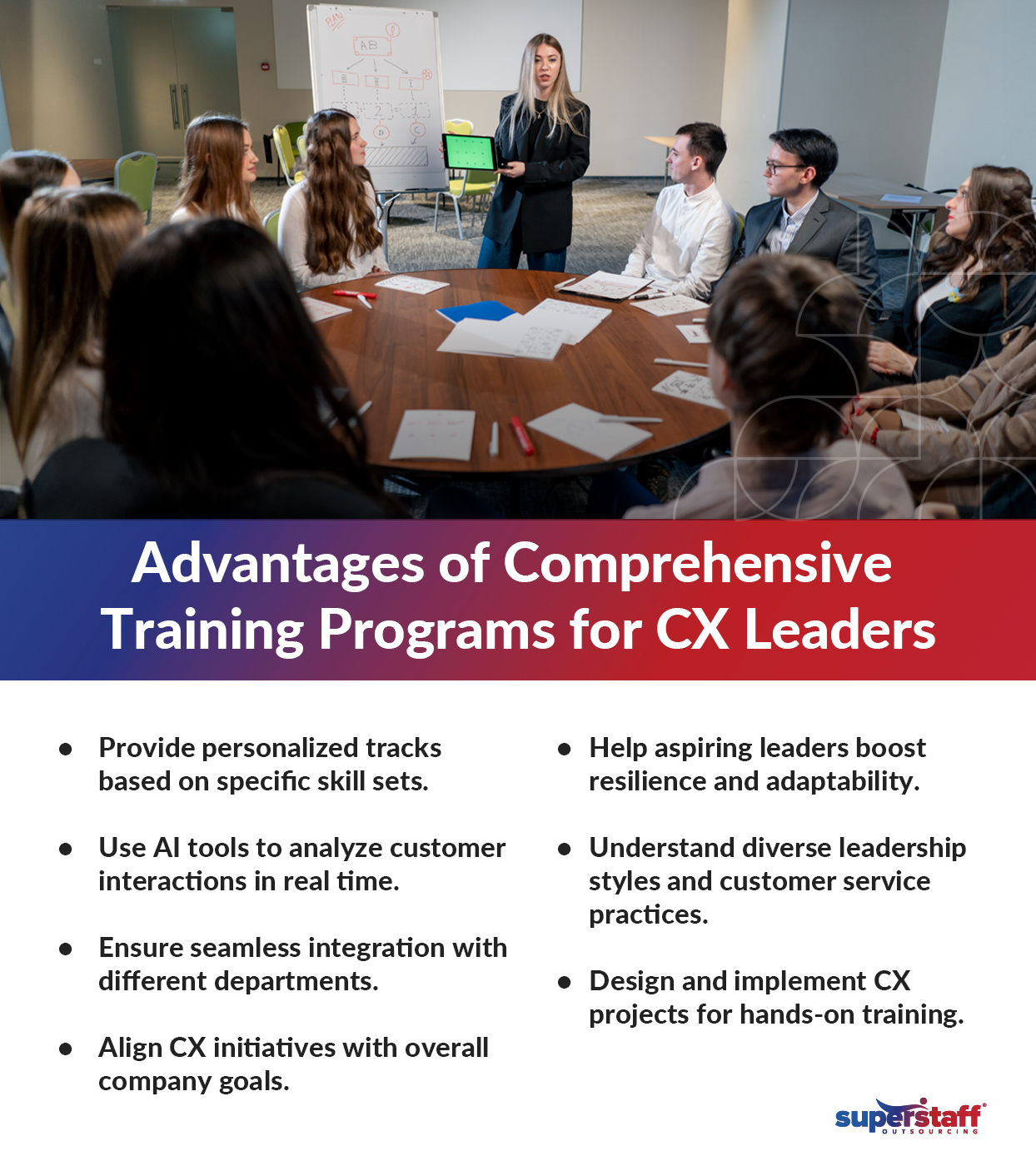
The customer experience (CX) landscape is rapidly growing and evolving in the modern age. Alongside the rising demand for CX solutions comes a greater need for innovative, resilient, and adaptable CX leadership to guide companies toward further growth and success.
In the business process outsourcing (BPO) industry, where CX plays a pivotal role, nurturing the next generation of leaders requires more than just conventional training. Leading BPO firms are adopting advanced, personalized development programs that prepare employees to become future CX leaders.
If you’ve always wanted to discover how customer experience outsourcing firms nurture future leaders, this article is for you. We’ll explore and break down the unique approaches within BPO training programs that build resilient, adaptive, and customer-centered leadership skills.
A Look Into the Training Programs of Customer Experience Outsourcing Teams
Providing world-class customer experiences is no walk in the park. Outsourced CX leaders and their teams undergo comprehensive training to stay updated on emerging industry trends, facilitate easier technology integration, and gain the knowledge and skills needed to create and implement effective CX strategies. Here’s how BPO companies set CX leaders up for success through guided professional development:

Personalized Skill Pathways
Instead of creating “one-size-fits-all” training programs, top BPOs now focus on individualized learning pathways. These pathways allow employees to choose career tracks aligned with their strengths and aspirations. Aspiring CX leaders gain more control over their career development by selecting their own professional goals and working toward the specific aspect of CX they want to prioritize.
Call center outsourcing companies offer employees clear routes to CX leadership roles by enabling a range of specialized tracks, from data analytics to tech fluency. These training programs often involve goal-oriented progress tailored to the particular development opportunities available to a specific individual or organization.
Tracks Based on Specific Skill Areas
Unlike traditional training programs, which offer a linear approach to learning, personalized pathways give aspiring CX leaders more flexibility in setting career goals and developing skills that help them meet those objectives. They can select tracks based on their interests, such as customer psychology, digital empathy, CX data analytics, technology, and innovation.
With this tailored approach, CX trainees can select the modules or courses that suit their learning style, pace, and specific professional targets. This will motivate and empower them during their training, giving them more control over their career journey. Plus, since they select which courses are linked to their personalized track, their engagement with and retention of the learning materials may improve significantly.
Goal-Oriented Progress
Traditional training programs measure progress by requiring participants to complete set courses and modules. However, since personalized pathways allow CX trainees to choose the particular skills they wish to learn, progress is measured by the learners’ set goals and milestones.
For example, one aspiring CX leader may opt to master customer data analytics, while another may focus on the client-facing aspects of business. Each learner can set their own milestones and targets, leading to tailored development plans and individualized key performance indicators (KPIs).
Real-Time Feedback and AI-Driven Coaching
Personalized training leads to more engaged employees and prepares them to lead with clarity and direction. However, to monitor the progress of aspiring CX leaders, BPO solutions companies leverage advanced tools and technologies to provide real-time feedback and coaching.
Using artificial intelligence (AI) tools and software, CX teams can more quickly and accurately monitor employee performance, provide instant feedback on customer interactions, and enable personalized mentoring focused on skill refinement. Real-time coaching makes CX development dynamic, equipping aspiring leaders and their employees to respond swiftly in high-stakes scenarios.
AI-Based Tools Analyze Live Interactions To Identify Improvement Areas
Customer support is crucial to a buyer’s experience, with agents acting as brand representatives and messengers. To strengthen customer experience initiatives and support CX leader training, many BPO companies are investing in AI-based tools for analyzing real-time interactions and identifying improvement areas.
Through AI-powered software, CX leaders can oversee real-time speech and sentiment analysis during live support interactions. This technology can help support teams to understand customers’ feelings by assessing their tone, choice of words, and pacing. When the AI analyzes that a customer interaction is going poorly, the CX leader can step in and assist the agent, helping the customer receive the support they need while training aspiring leaders and their employees.
Another advantage of artificial intelligence technology for CX is monitoring agent KPIs. Built-in AI-driven software can accurately track and analyze support agents’ performance across multiple client interactions, noting data such as average handling time (AHT), average resolution time, call abandonment rates, and more. With this data, aspiring CX leaders can more effectively manage their teams and identify which employees need further assistance and training.
Custom Coaching Helps Employees Hone Adaptability and Decision-Making Skills
Leading BPO companies offer custom coaching programs to support CX leader training. Unlike traditional coaching, where trainers handle an entire group, this tailored initiative enables aspiring leaders to receive one-on-one mentorship and coaching customized to their specific needs and goals.
Compared to standardized coaching programs, highly tailored coaching allows individual trainees to set unique goals and objectives and receive personalized advice and feedback. Because of this flexibility, aspiring CX leaders hone their adaptability and decision-making skills, enabling them to pivot and adapt to the industry’s constantly shifting demands.
Cross-Functional Collaboration as Core Training
Although CX leaders primarily focus on department-specific tasks, cross-functional collaboration is a crucial skill to master. It allows them to see the bigger picture when crafting strategies and projects. Modern BPOs encourage this cross-functional exposure, giving future CX leaders broader business perspectives.
Through collaboration with marketing, data analytics, and IT, employees gain a more comprehensive view of customer experience strategies. Cross-functional training empowers CX leaders to better understand an organization’s inner workings and make impactful decisions aligned with the company’s strategic goals.
Integration With Departments That Influence CX
Customer experience doesn’t exist in a vacuum. All other business processes and departments, from front-facing operations like sales and marketing to back-office functions like IT and accounting, contribute to creating a seamless and positive buyer experience.
As such, CX leaders must learn to collaborate and communicate effectively with other departments. For example, the CX team may want to add a new live chat feature to the brand’s website to give potential customers an easy way to send inquiries or request assistance. To implement this feature, they must coordinate with the website development and information technology (IT) team.
Development of Holistic Decision-Making Abilities
Before making any decisions, CX leaders must consider how their ideas could impact other departments or the whole organization. Developing and practicing holistic decision-making is crucial to creating CX initiatives and programs that align with the company’s objectives and goals.
When a holistic context guides all CX decisions, department leaders can ensure a seamless relationship across different business areas. They can also feel more confident making short—and long-term decisions because all department leaders work together towards a common goal.
Leadership Resilience and Adaptive Mindset Training
In addition to practicing cross-functional collaboration, customer experience leaders must learn to be resilient and adaptable. These two traits are crucial for thriving in an ever-evolving industry. As consumer preferences change and market conditions shift, CX leaders must be able to think on their feet and pivot strategies when necessary.
With the proper training, future leaders can build the resilience they need to handle the fast-paced, high-pressure world of CX. BPO training programs now include resilience and adaptive thinking classes, covering essential skills like crisis response and change management.
Emphasis on Stress Management and Change Readiness
To build resilience, CX leaders must be trained to manage stress and adapt to changes appropriately. According to a Deloitte study, the relentless demands of business leadership have bred high levels of exhaustion and stress among C-suite executives. Because of this, over 75% of executives have seriously considered quitting their jobs to care for their mental health and well-being.
Working an average of 62.5 hours per week, excluding requests and meetings outside of the office, business leaders tend to overexert themselves, leading to fatigue and burnout. In fact, this excessive stress created widespread consequences in previous years, leading to The Great C-Suite Resignation of 2023, where a record number of executives left their positions.
Knowing these facts, CX leaders must be prepared to experience stress and know how to handle it effectively. Through stress management classes, leadership trainees can learn to identify stressors and manage their stress levels, helping them efficiently juggle multiple priorities, make important decisions, and lead their teams seamlessly.
Training on Proactive Responses to CX Challenges
In the past, customer service was limited to reactive support, with consumers only contacting brand representatives when they already have a complaint or problem with the company’s products or services. Today, forward-thinking businesses increasingly invest in proactive customer care as part of their CX strategy.
According to a 2024 Zendesk CX Trends Report, 70% of companies leverage advanced technologies that automatically analyze customer interactions. These tools help CX professionals gauge how best to engage a particular client and enable them to provide proactive customer care.
The next generation of customer experience outsourcing leaders must understand the advantages of a proactive approach to CX challenges. With the proper training, these aspiring leaders can learn how best to anticipate buyer needs, deepen connections with existing users, and optimize their journeys.
Comprehensive training programs will involve understanding common customer pain points, personalizing brand experiences through human-centered AI designs, and creating a preventative approach to customer service. This greater emphasis on proactive care will help aspiring CX leaders ensure accountability and transparency while reflecting a more profound empathy for their buyers.

Mentorship Networks With Industry Veterans
Beyond personalized training, cross-functional collaboration, and classes on resilience and proactive customer care, aspiring CX leaders also benefit from continuous mentorship from industry veterans. By pairing future leaders with experienced mentors worldwide, BPOs provide cultural and operational insights beyond conventional training, enabling them to learn from real-life cases and stories.
Traditional training programs offer theoretical lessons and insights, but mentorship networks provide real-world learning and practical knowledge. Continuous guidance from mentors across different geographies can help customer experience trainees see and compare different leadership styles and learn to adapt to diverse situations and contexts. At the same time, they gain exposure to unique customer service practices that could help them build their own CX strategies.
Guidance From Mentors Across Different Geographies
According to a McKinsey report, companies prioritizing diversity in the workplace are more likely to outperform their competitors, showing a 39% increased likelihood of gaining a financial advantage. This eye-opening statistic showcases how vital it is for businesses to embrace diversity and allow employees to gain exposure to people from different cultures and backgrounds.
Aspiring CX leaders benefit from hearing diverse perspectives and ideas. This can help them fuel creativity and innovation, ensuring they do not stick to only tried-and-tested approaches to customer experience. By working with mentors across different geographies, they can better understand cultural differences and varying leadership styles, helping them foster and embrace diversity within their teams and departments.
Exposure to Diverse Customer Service Practices
Aside from learning different leadership styles and fueling creative thinking, another advantage of diverse mentorship programs is exposure to various customer service practices. The CX strategy that works best for a particular market may not be effective for another location or industry. As such, aspiring leaders must familiarize themselves with diverse customer service practices so they can gain a better understanding of different markets and their particular buyer preferences and expectations.
Micro-Learning and Certification Programs
Not all customer experience topics require dedicated training programs. Some information and skills can be learned through quick, specialized classes. To address these niche topics, BPOs provide micro-learning sessions and certifications to build CX expertise efficiently.
During these micro-learning sessions, employees complete short, focused training classes that fit within their workflow, making skills development more manageable and accessible. These bite-sized courses focus on practical knowledge and experiences, ensuring that CX skills are ingrained and can be applied immediately.
Bite-Sized Training on CX Essentials Like Customer Data Privacy
Micro-learning sessions can be beneficial for understanding the basics of a specialized topic or learning practical skills that can be immediately applied to daily workloads. Some examples of bite-sized training on CX essentials include creating Voice of Customer (VoC) programs, mapping out customer journeys, designing customer data privacy policies and protocols, and using financial metrics to gauge ROI for CX.
Certifications As Tangible Achievements for Motivation and Recognition
BPO companies often provide course completion certificates to help CX trainees feel more motivated and engaged with their training. These certificates can show mastery over a particular subject or skill, assisting learners to market themselves to clients. At the same time, they can be the company’s way of acknowledging aspiring CX leaders for their accomplishments and continued professional growth.
Customer-Centric Innovation Projects
Finally, to cap off their training and showcase everything they’ve learned, CX leadership trainees must complete a customer-centric innovation project of their choice. These initiatives give future leaders direct, on-the-job experience in creating and implementing CX strategies.
Through these projects, BPOs encourage employees to develop and present solutions to real customer challenges, offering a direct path to hands-on learning. They can also help foster a culture of innovation and prepare leaders to drive CX improvements.
Opportunity To Pitch Projects to Executive Teams
Before CX trainees can implement customer-centric projects, they must pitch their ideas to executive teams. These pitching sessions help aspiring leaders learn how to market their initiatives and gain the necessary funding to make their plans a reality. Executives on the panel can also offer suggestions and input on the project, helping trainees refine their ideas and plans.
Potential for Projects To Be Implemented Company-Wide
Once the executive team has reviewed and approved project pitches, CX leaders can implement them company-wide. This allows them to see how their initiatives impact not just their team or department but the entire organization. As they complete their training, they can seamlessly transition into a full-time leadership role and collaborate with multiple department leaders to integrate and maintain their project vision.
Build a Future-Ready Customer Experience Outsourcing Team With SuperStaff
Today’s BPOs are dedicated to developing forward-thinking, resilient CX leaders through specialized training programs. From personalized learning pathways to real-time AI coaching, cross-functional collaboration, and innovation projects, these programs offer robust preparation for CX leadership.
To build a future-ready CX team, BPOs must continue investing in employee development that balances technical skills with resilience and customer-centered innovation. This is precisely what we aim to do here at SuperStaff.
With comprehensive training and development, SuperStaff provides crucial growth opportunities for its employees while offering world-class service to clients. Let us be your reliable partner in improving customer experience initiatives and positioning your brand for global success.
Contact us today for a quick consultation to learn more about our customer experience outsourcing solutions!






